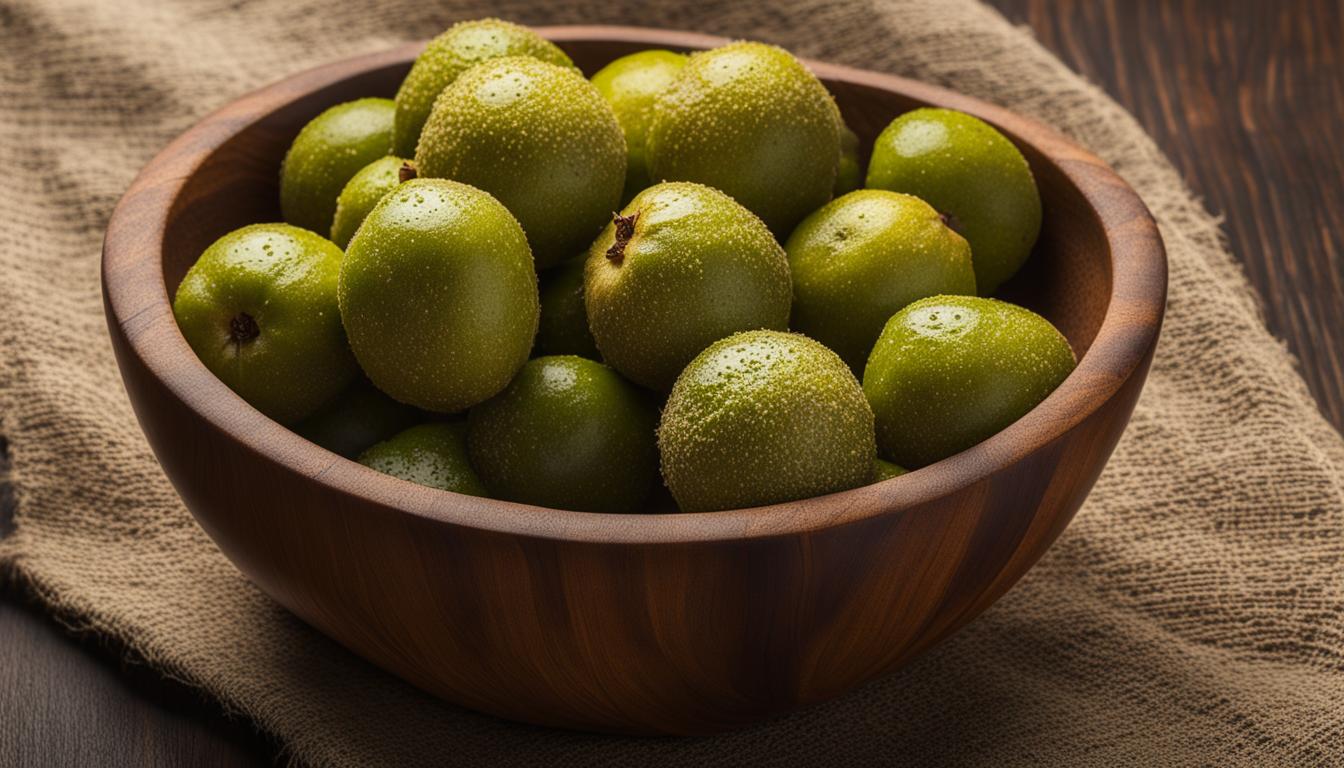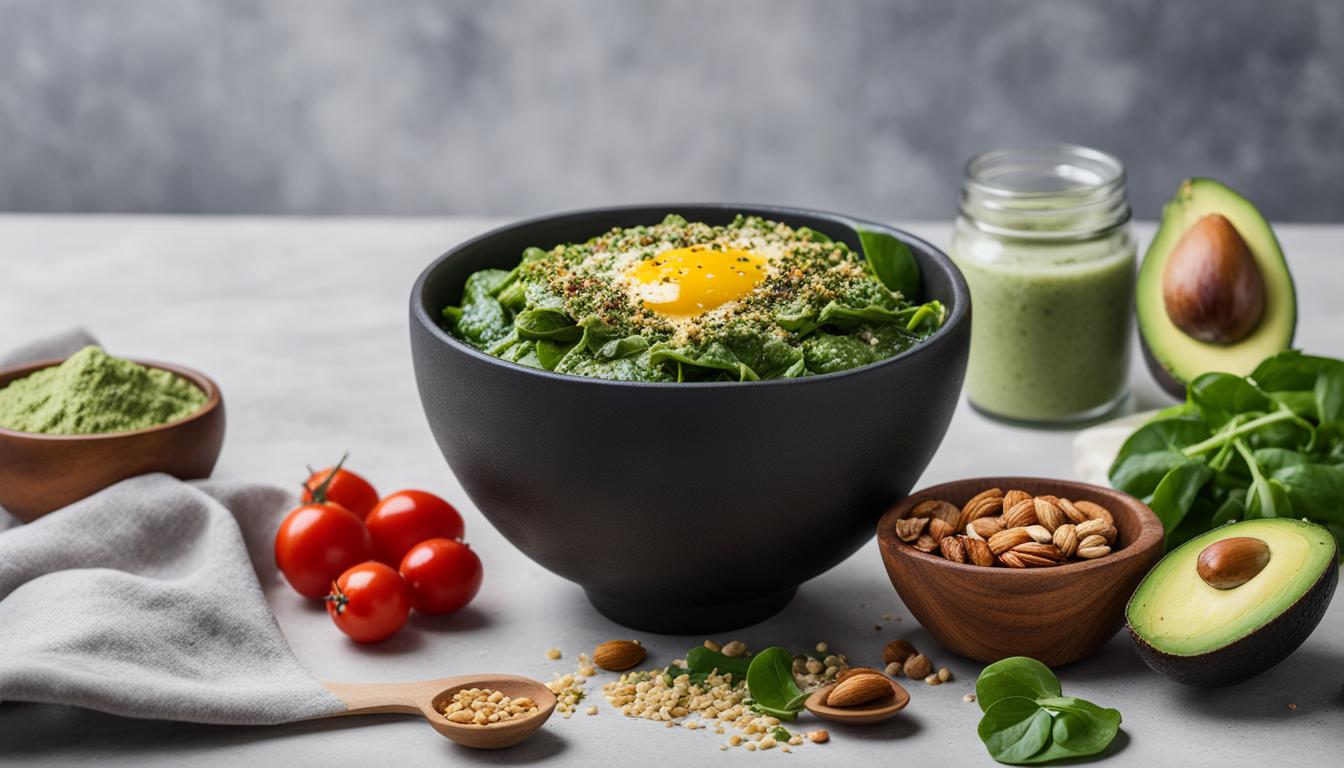On a keto diet, maintaining ketosis is key to achieving desired results. This low-carb, high-fat diet requires careful consideration of the ingredients used, especially when it comes to sweeteners. Agave syrup, known for its natural origins and sweet taste, is a popular choice for many recipes. But can you use agave in keto recipes? Let’s explore its suitability and discover alternative keto-approved sweeteners.
Agave syrup, although derived from the agave plant, is not considered keto-friendly. It is relatively high in carbs, posing a challenge for those following a keto diet. With over 40 grams of carbs per serving, agave syrup can easily kick you out of ketosis. However, there are numerous low-carb sweeteners available that can satisfy your sweet tooth without compromising your keto lifestyle.
Key Takeaways:
- Agave syrup is not keto-friendly due to its high carb content.
- On a keto diet, it is crucial to choose sweeteners that have minimal impact on blood sugar levels.
- Alternative keto-approved sweeteners like monk fruit and stevia can be used as substitutes for agave syrup.
- Experimenting with different sweeteners can help find the right balance of sweetness while staying in ketosis.
- Consider the impact of sweeteners on blood sugar levels when selecting ingredients for your keto recipes.
What is a Keto Diet?
A keto diet, short for ketogenic diet, is a low-carb, high-fat diet that has gained popularity for its potential health benefits and weight loss effects. This diet involves reducing carbohydrate intake and replacing it with fat, forcing the body to enter a metabolic state called ketosis.
On a standard American diet, people typically consume around 200-350 grams of carbs per day. However, on a keto diet, carbohydrate intake is drastically reduced to 20-50 grams per day. This low carb intake shifts the body’s primary source of energy from carbohydrates to fat.
When carbohydrates are limited, the body begins to break down fat into molecules called ketones. Ketones serve as an alternative fuel source for the body, including the brain. This metabolic switch from carbohydrates to fat is what makes the keto diet unique.
The main goals of a keto diet include:
- Reducing body weight and body fat
- Improving insulin sensitivity and blood sugar control
- Increasing energy levels
- Enhancing mental clarity and focus
- Reducing inflammation in the body
By limiting carbohydrate intake and increasing fat consumption, the keto diet aims to optimize the body’s ability to burn stored fat for fuel, leading to weight loss and other metabolic benefits.
To better understand the principles of a keto diet, let’s take a look at the macronutrient composition:
| Macronutrient | Percentage of Daily Calories | Examples |
|---|---|---|
| Carbohydrates | 5-10% | Leafy greens, vegetables, berries |
| Protein | 15-20% | Meat, fish, eggs, dairy, legumes |
| Fat | 70-80% | Avocado, nuts, seeds, oils, butter |
This macronutrient breakdown ensures a minimal intake of carbs while providing an adequate supply of protein and a high amount of healthy fats.
It’s important to note that a keto diet may not be suitable for everyone, especially those with certain medical conditions or who are pregnant or breastfeeding. Consulting with a healthcare professional or registered dietitian before starting any new diet is recommended.
Now that we’ve covered the basics of a keto diet, let’s dive deeper into the importance of choosing keto-friendly sweeteners in the next section.
The Importance of Choosing Keto-Friendly Sweeteners
When following a keto diet, choosing the right sweeteners is essential to maintain ketosis and support your low-carb lifestyle. Traditional sweeteners like white sugar are high in carbs and can disrupt your body’s fat-burning state. To satisfy your sweet tooth while staying keto-friendly, it’s important to find low-carb sweeteners that provide sweetness without spiking your blood sugar levels.
By opting for keto-friendly sweeteners, you can continue to enjoy delicious treats and beverages without derailing your progress. These sugar alternatives offer the sweetness you crave while minimizing the impact on your blood sugar levels. Whether you’re baking, sweetening your coffee, or making keto-friendly desserts, choosing the right sweetener is key.
“Choosing keto-friendly sweeteners allows you to indulge your sweet cravings without compromising your progress on a ketogenic diet.”
The Impact of Blood Sugar Levels on Ketosis
When following a keto diet, maintaining ketosis is crucial for burning fat and achieving your health goals. Ketosis is a metabolic state where your body uses fat as its primary fuel source instead of carbohydrates. Consuming high-carb sweeteners can cause your blood sugar levels to rise, disrupting ketosis and potentially leading to cravings and energy crashes.
By selecting low-carb sweeteners, you can help keep your blood sugar levels stable. These sweeteners provide sweetness without the additional carbs, allowing you to enjoy the flavors you love while staying in ketosis.
Keto-Friendly Sweeteners for Your Low-Carb Journey
There are a variety of keto-friendly sweeteners available that can be easily incorporated into your favorite recipes. Whether you prefer natural options or artificial alternatives, there’s a sweetener to suit your taste and dietary needs.
Natural Keto-Friendly Sweeteners
When it comes to natural sweeteners, options like monk fruit and stevia are popular choices for those on a keto diet. These sweeteners are derived from plants and provide sweetness without the extra carbs. Monk fruit is up to 250 times sweeter than sugar and contains no calories or carbs, making it an excellent sugar alternative. Stevia, on the other hand, is 250-300 times sweeter than sugar and contains no carbs or calories.
Artificial Keto-Friendly Sweeteners
If you prefer artificial sweeteners, options like sucralose, xylitol, and erythritol are keto-friendly choices. Sucralose is a zero-calorie sweetener that is 200-700 times sweeter than sugar. Xylitol has a similar taste to sugar but contains no carbs, making it a popular alternative. Erythritol is another zero-calorie sweetener with about 60-80% of the sweetness of sugar, and it only has 0.2 calories per gram.
Choosing the Right Sweetener for Your Taste
Finding the perfect keto-friendly sweetener may require some experimentation. Each sweetener has its own distinctive taste, and some may have a slight aftertaste. To determine your preferred sweetener and achieve the flavors you desire, try sampling different options in your recipes. You can also find keto-friendly sweetener blends that combine natural and artificial sweeteners for a well-rounded taste profile.
Remember, moderation is key when it comes to sweeteners, even those that are keto-friendly. While these sweeteners offer a low-carb alternative to traditional sugar, it’s important to consume them in moderation as part of a balanced keto diet.
Keto-Friendly Sweeteners Table
| Sweetener | Description | Sweetness compared to sugar | Carbohydrates per serving | Calories per serving |
|---|---|---|---|---|
| Monk Fruit | A natural sweetener derived from a fruit. It has no calories or carbs. | 100-250 times sweeter than sugar | 0g | 0g |
| Stevia | An extract from the leaves of the stevia plant. It has no calories or carbs. | 250-300 times sweeter than sugar | 0g | 0g |
| Sucralose | An artificial sweetener that is calorie-free. | 200-700 times sweeter than sugar | 0g | 0g |
| Xylitol | A sugar alcohol with a similar taste to sugar. It has no carbohydrates. | Similar to sugar | 0g | 2.4 calories per gram |
| Erythritol | A sugar alcohol with about 60-80% the sweetness of sugar. It has 0.2 calories per gram. | 60-80% as sweet as sugar | 0g | 0.2 calories per gram |
Natural Keto-Friendly Sweeteners
When it comes to sweetening your keto recipes, natural sweeteners are a great choice. They provide the sweetness you crave without adding unnecessary carbs. Here are three keto-friendly natural sweeteners to consider:
1. Monk Fruit
If you’re looking for a sweetener that won’t spike your blood sugar levels, monk fruit is an excellent option. This natural sweetener is incredibly sweet, ranging from 100 to 250 times sweeter than sugar. The best part? It has zero calories and zero carbs. So, you can satisfy your sweet tooth without derailing your keto diet.

2. Stevia
Derived from the leaves of the Stevia rebaudiana plant, stevia is another popular keto-friendly sweetener. It is approximately 250 to 300 times sweeter than sugar, providing a potent sweetness without any carbs or calories. Whether you’re adding it to your morning coffee or baking keto desserts, stevia is a versatile option for your low-carb lifestyle.
3. Yacon Syrup
If you’re looking for a natural sweetener that also offers some health benefits, yacon syrup is worth considering. This syrup is extracted from the roots of the yacon plant, which is native to South America. Yacon syrup is a great source of fiber and contains fewer calories than table sugar. With its deliciously sweet taste and lower glycemic impact, yacon syrup makes for a great keto-friendly alternative.
These natural keto sweeteners provide a guilt-free way to satisfy your sweet cravings while staying on track with your ketogenic journey. So, go ahead and experiment with these options to find the perfect sweetener for your favorite keto recipes.
Artificial Keto-Friendly Sweeteners
While natural sweeteners are a popular choice for those following a keto diet, artificial sweeteners can also provide a keto-friendly option. These sweeteners offer the sweetness you crave without the carbohydrates that can disrupt ketosis. Let’s explore some artificial sweeteners that are suitable for a keto lifestyle.
Sucralose
Sucralose is a zero-calorie artificial sweetener that is 200-700 times sweeter than sugar. It is commonly found in a variety of sugar-free products, including beverages, baked goods, and condiments. Sucralose does not have an impact on blood sugar levels, making it an ideal choice for those on a keto diet.
Xylitol
Xylitol is a sugar alcohol that tastes similar to sugar but does not contain any carbohydrates. It is commonly used as a sweetener in chewing gum, toothpaste, and some sugar-free desserts. Xylitol has a low glycemic index and does not raise blood sugar levels, making it a popular choice for those following a keto lifestyle.
Erythritol
Erythritol is another sugar alcohol that has about 60-80% the sweetness of sugar but only contains 0.2 calories per gram. It is commonly used as a sweetener in sugar-free candies, chocolates, and baked goods. Erythritol does not have an impact on blood sugar levels and is well-tolerated by most individuals.
Erythritol is a suitable sugar substitute for those on a keto diet. It provides the sweetness you desire without the added carbohydrates that can hinder ketosis.
When using artificial sweeteners, it is important to note that they may have a different taste profile compared to sugar. It can be helpful to experiment with different sweeteners to find one that suits your preferences and baking needs.
| Sweetener | Sweetness compared to sugar | Calories per gram | Impact on blood sugar levels |
|---|---|---|---|
| Sucralose | 200-700 times sweeter | No calories | No impact |
| Xylitol | Similar to sugar | No carbohydrates | No impact |
| Erythritol | About 60-80% the sweetness of sugar | 0.2 calories | No impact |
Sweeteners to Avoid on a Keto Diet
While there are several keto-friendly sweeteners available, it is important to be aware of the sweeteners that should be avoided on a keto diet due to their high carb content. These sweeteners can spike blood sugar levels and hinder progress in achieving and maintaining ketosis. Here are some sweeteners to avoid:
| Sweetener | Carb Content (per 1 tbsp) |
|---|---|
| Maltodextrin | 12 grams |
| Honey | 17 grams |
| Coconut sugar | 15 grams |
| Maple syrup | 13 grams |
| Agave nectar | 16 grams |
| Dates | 16 grams |
These sweeteners are high in carbs and can quickly add up, significantly impacting blood sugar levels. Therefore, it is crucial to read labels carefully and avoid these sweeteners when following a keto diet.
Choosing alternative low-carb sweeteners can help maintain ketosis and satisfy your sweet cravings without derailing your progress on a keto diet.
Agave Syrup and its Suitability for Keto
Agave syrup, a natural sweetener derived from the agave plant, is commonly used as an alternative to traditional sugar. However, when it comes to a keto diet, agave syrup may not be the best choice. Despite being a natural option, agave syrup is high in fructose, and almost 85% of its composition is fructose. The consumption of high fructose can have negative effects on blood sugar levels, leading to obesity and an increased risk of developing type 2 diabetes.
Furthermore, agave syrup contains more than 40 grams of carbohydrates per serving, making it too carb-heavy to fit into a keto diet. The restriction of carbohydrates is a central aspect of the ketogenic approach, aiming to achieve and maintain a state of ketosis, where the body utilizes fat for energy instead of carbohydrates.
To adhere to a keto lifestyle while still satisfying your sweet tooth, there are several low-carb alternatives to agave syrup that you can consider:
- Monk Fruit: Monk fruit extract is a natural sweetener that contains zero calories and carbohydrates. It is considered an excellent substitute for agave syrup in keto recipes.
- Stevia: Derived from the leaves of the Stevia rebaudiana plant, stevia is a zero-calorie, zero-carb sweetener that provides a similar level of sweetness as agave syrup without affecting blood sugar levels.
- Erythritol: Erythritol is a sugar alcohol that contains only 0.2 calories per gram and has no impact on blood sugar. It can be used as a low-carb substitute for agave syrup in various recipes.
With these low-carb alternatives, you can still enjoy sweetness while keeping your carb intake in check on a keto diet. Experiment with different sweeteners and discover the flavors that suit your taste buds best.
In summary, agave syrup is not suitable for a keto diet due to its high fructose content and significant carbohydrate load. Instead, opt for low-carb alternatives like monk fruit, stevia, or erythritol to satisfy your sweet cravings while maintaining ketosis.
| Agave Syrup | Monk Fruit | Stevia | Erythritol | |
|---|---|---|---|---|
| Carbohydrates per Serving | Over 40 grams | 0 grams | 0 grams | 0 grams |
| Impact on Blood Sugar Levels | High | No impact | No impact | |
| Calories per Serving | Over 160 calories | 0 calories | 0 calories |

Choosing Keto-Friendly Sweeteners for Your Recipes
When it comes to sweetening recipes on a keto diet, it’s crucial to select keto-approved sweeteners that won’t derail your progress. Fortunately, there are plenty of options available that can provide sweetness without the extra carbs. From natural sweeteners to artificial substitutes, here are some choices to consider:
Natural Sweeteners
- Monk Fruit: A zero-calorie sweetener that is 100-250 times sweeter than sugar. It contains no carbs and has minimal impact on blood sugar levels.
- Stevia: Derived from a plant, stevia is a popular natural sweetener that is 250-300 times sweeter than sugar. It has no carbs or calories.
Artificial Sweeteners
- Sucralose: A zero-calorie sweetener that is 200-700 times sweeter than sugar. It does not impact blood sugar levels and can be used in various keto recipes.
- Xylitol: A sugar alcohol that tastes similar to sugar without the carbohydrates. It’s a keto-friendly alternative for sweetening baked goods.
- Erythritol: Another sugar alcohol that has about 60-80% of the sweetness of sugar with only 0.2 calories per gram. It does not affect blood sugar levels and is commonly used in keto-friendly recipes.
Experimenting with different sweeteners can help you find the right balance of sweetness without compromising ketosis. Whether you prefer the natural sweetness of monk fruit and stevia or the convenience of artificial sweeteners like sucralose, xylitol, and erythritol, there are options available to suit your taste preferences and dietary needs.
The Impact of Sweeteners on Blood Sugar Levels
Blood sugar levels play a crucial role in the success of a keto diet. While some sweeteners are known to have a minimal impact on blood sugar levels, others can disrupt ketosis. Let’s explore the effect of sweeteners on blood sugar levels and their suitability for a keto lifestyle.
The Agave Syrup Glycemic Index
Agave syrup, often touted as a healthier alternative to sugar, has a lower glycemic index compared to regular sugar. The glycemic index is a measure of how quickly a carbohydrate-containing food raises blood sugar levels. However, despite its relatively low glycemic index, agave syrup is high in carbs and can still cause a spike in blood sugar levels, making it unsuitable for a keto diet.
Choosing Sweeteners for Keto
When following a keto diet, it’s essential to choose sweeteners that have minimal impact on blood sugar levels. Natural sweeteners like monk fruit and stevia, as well as artificial sweeteners like sucralose and erythritol, are excellent choices as they have little to no effect on blood sugar levels.
| Sweetener | Glycemic Index | Impact on Blood Sugar Levels |
|---|---|---|
| Monk Fruit | 0 | Minimal |
| Stevia | 0 | Minimal |
| Sucralose | 0 | Negligible |
| Erythritol | 0 | Negligible |
These sweeteners provide the desired sweetness without causing a spike in blood sugar levels, allowing you to enjoy sweet treats while maintaining ketosis.
“Choosing sweeteners with minimal impact on blood sugar levels is crucial for those following a keto diet.”
Conclusion
After examining the agave syrup nutrition facts and its impact on keto diets, it is clear that agave syrup is not suitable for those following a keto lifestyle. With its high carb content and almost 85% fructose, agave syrup can disrupt ketosis and negatively affect blood sugar levels. However, there are plenty of alternatives available for sweetening keto recipes while maintaining ketosis.
For those looking for natural sweeteners, monk fruit and stevia are excellent choices. They provide sweetness without the extra carbs and have no impact on blood sugar levels. Artificial sweeteners like sucralose and erythritol are also keto-friendly options, with zero or minimal calories and no effect on blood sugar.
In conclusion, when it comes to sweetening your keto recipes, it is important to choose keto-approved sweeteners that have minimal impact on blood sugar levels. Agave syrup is not compatible with keto diets due to its high carb content, but there are numerous alternatives to explore. Experimenting with different sweeteners can help you find the right balance of sweetness while maintaining ketosis and achieving your health goals.
FAQ
Can I use agave syrup in keto recipes?
No, agave syrup is not suitable for keto diets due to its high carb content.
What is a keto diet?
A keto diet is a low-carb, high-fat diet that forces the body to burn fat for energy instead of carbohydrates.
Why is it important to choose keto-friendly sweeteners?
Choosing keto-friendly sweeteners is important because they have minimal impact on blood sugar levels, helping to maintain ketosis.
What are some natural keto-friendly sweeteners?
Some natural keto-friendly sweeteners include monk fruit, stevia, and yacon syrup.
What are some artificial keto-friendly sweeteners?
Some artificial keto-friendly sweeteners include sucralose, xylitol, and erythritol.
Which sweeteners should be avoided on a keto diet?
Sweeteners such as maltodextrin, honey, coconut sugar, maple syrup, agave nectar, and dates should be avoided on a keto diet due to their high carb content.
Can I use agave nectar on a keto diet?
No, agave nectar is not recommended for keto diets due to its high carb content.
How can I choose keto-friendly sweeteners for my recipes?
You can choose keto-friendly sweeteners by opting for natural sweeteners like monk fruit and stevia, or artificial sweeteners like sucralose and erythritol.
Do sweeteners impact blood sugar levels?
Yes, sweeteners can impact blood sugar levels, which is why it is important to choose sweeteners with minimal impact on blood sugar for a keto diet.
What are the nutrition facts of agave syrup?
Agave syrup contains over 40 grams of carbs per serving, making it high in carbs and unsuitable for a keto diet.


